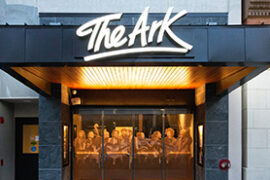By Adeline Griffith
Sarah Krzywicki admits she wanted another choice than the school down the road. She just “wasn’t a fan” of public schools and wanted to find a place she felt comfortable and one where she could focus more on her future, not just her present.
“(Washtenaw Technical Middle College) gave me opportunities that public school would not have given,” said, Krzywicki, a recent WTMC graduate with a liberal arts degree. “I don’t feel that I missed out on a normal high school experience. WTMC is just an enhanced high school experience.”
Washtenaw Technical Middle College (WTMC), established in 1997, gives high school students a unique learning experience that allows them to graduate with up to 80 college credits. Students at WTMC begin their time in the program taking four core classes at a high school level: science, English, mathematics, and critical thinking. In these classes, students are assessed on both their academic skills and their life management skills. They must demonstrate skill in both areas before enrolling in college courses.
“The president at the time, Gunder Myran, saw a need for technical and vocational training,” said Karl Covert, the dean of WTMC. “There were not enough of those types of opportunities for students in Washtenaw County.”
Once students have earned at least a ‘B’ in all academic areas and have consistently shown college-ready behavior, they begin their life as a college student.
“High school gets students ready for college, but we produce college successful students,” said Covert, referring to the difference between conventional high school and programs like WTMC. “Students, the majority of them anyway, will be leaving high school with 2 years of college already done.”

Students have to meet the requirements and prerequisites of WCC to graduate. After taking the core courses required by WCC, students choose either a technical certificate or Associate’s degree from one of the sixty programs offered at Washtenaw. They then must put together an Educational Development Plan (EDP), which maps a class schedule for each semester.
Although the social aspect appears to differ greatly from that of a normal high school, since students will often be the only high-schooler in a room full of college students as opposed to being grouped with people their own age, students don’t feel they are lacking the sociability that a conventional high school provides.
“I made a ton of friends that I have a lot in common with,” said Leena Ali, a WTMC student currently enrolled in the photography program. “It also helped me to discover myself a lot earlier than I would have if I were in a regular high school.”
WTMC also makes an effort to provide events that a typical high school would, such as an annual prom in April.
“Initially, not everyone was in favor of WTMC. There were a lot of growing pains and learning, for the college and for WTMC, during the early years,” said Covert.
After 22 years, WTMC has proved itself to be a successful program worth keeping on campus. WTMC has a 97 percent success rate and was named one of the best high schools in America by Newsweek, according to statistics presented by the Board of Trustees in 2017.
The Board also reported that although the high school students make up only 2 percent of people on campus, they account for about 15 percent of those completing certificates and degrees.
“We don’t just take the best and the brightest. We don’t test students in. Anyone can come here,” said Covert.
Although the concept of a technical middle college—commonly referred to as an “early middle college”—is relatively new, similar models are seen throughout the state of Michigan. Eastern Michigan University, Central Michigan University, Grand Rapids Community College and Kalamazoo Valley Community College are a few examples of colleges in Michigan with resources available to high school students extending beyond dual enrollment.
Although they are structured slightly differently than WTMC, they still allow high school students to graduate with either a certificate, Associate’s degree, or a significant amount of college credit under their belt.
“It would be great to have more of these types of programs and education opportunities for students,” said Covert.










